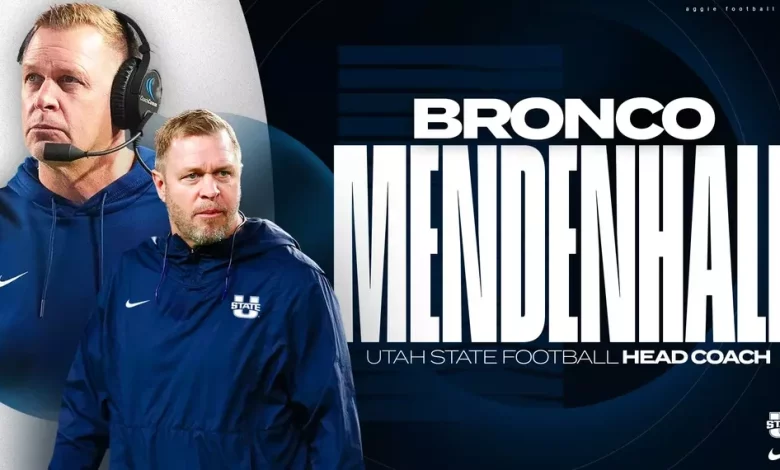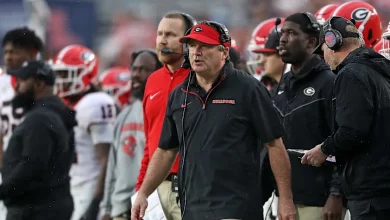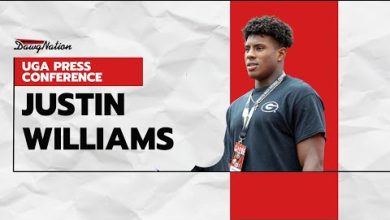Bronco Mendenhall’s most important task as Utah State’s new coach? Find NFL talent

Bronco Mendenhall, appointed as Utah State’s new head football coach, has inherited a program with a rich history and a bright future. As one of the most respected names in college football, Mendenhall comes to Utah State with a wealth of experience, having built programs from the ground up and brought success to multiple programs. His tenure at Virginia, where he led the Cavaliers to sustained success, proved his ability to develop talent, create a winning culture, and turn programs into contenders. But as he steps into the role at Utah State, his most important task will not only be continuing the legacy of the Aggies but also focusing on something that could transform the program: finding and developing NFL talent.
Utah State’s History of NFL Talent
Before diving into Mendenhall’s role, it’s important to understand Utah State’s history when it comes to producing NFL-caliber talent. The Aggies have had their share of success on the professional level, particularly in recent years. Players like quarterback Jordan Love, who was selected in the first round of the 2020 NFL Draft by the Green Bay Packers, have put Utah State on the map as a program that can develop talent capable of competing at the highest levels.
However, Utah State’s track record of sending players to the NFL hasn’t been as prolific as some other Power Five programs. In fact, historically, the school has been considered more of a stepping stone for players looking to make a name for themselves. But with a coaching staff that has the ability to develop talent and focus on improving player performance, that narrative could change.
For Mendenhall, building a pipeline to the NFL is not just about finding raw athletic talent, but about creating a developmental system where players can reach their full potential and have a legitimate shot at playing professionally. For any college program, the ability to produce NFL talent is a defining characteristic that helps build credibility and attracts high-level recruits. In this respect, Mendenhall’s most important task will be to position Utah State as a legitimate contender in the race to produce the next generation of NFL stars.
Recruiting the Right Talent
One of the first things Mendenhall will need to do is recruit players who have the potential to play at the next level. In college football, recruiting is everything. To build a successful program, a coach must identify talent early, build relationships with high school coaches, and establish a reputation that resonates with young athletes.
Utah State, traditionally an underdog in the Mountain West Conference, does not have the luxury of recruiting the same top-tier talent that major Power Five programs like Alabama, Ohio State, and Georgia do. However, this also presents an opportunity for Mendenhall to find diamonds in the rough—players who may not have received attention from other programs but have the raw athleticism and potential to play at the highest level.
Mendenhall’s ability to scout talent and develop relationships with recruits will be crucial. His coaching staff will need to cast a wide net and evaluate prospects beyond the traditional recruiting hotbeds, looking for those hidden gems who could be the future stars of the NFL. By targeting players with high athletic upside, work ethic, and drive, Mendenhall can position Utah State as a place where NFL talent is developed.
Developing Players for the NFL
While recruiting the right talent is important, Mendenhall’s ability to develop players will be what truly separates Utah State from other mid-major programs. Many of the most successful college programs in the country excel not just in recruiting, but in player development. Mendenhall has demonstrated throughout his career that he is a coach capable of developing players into NFL prospects.
Mendenhall’s success at Virginia can be attributed in large part to his ability to build programs from the ground up. He developed an impressive defensive scheme, focusing on player fundamentals, technique, and discipline. By creating a culture that emphasized hard work and accountability, Mendenhall helped elevate the Cavaliers to perennial bowl contenders.
At Utah State, his approach will need to be similar. While his time at Virginia helped him refine his methods of developing talent, his experience as an assistant coach at BYU earlier in his career also provided him with valuable insights into what it takes to succeed at the highest level. Mendenhall understands that developing NFL talent goes beyond just on-field performance. It involves refining mental toughness, improving physical conditioning, and teaching players how to handle the pressures of a professional football career.
One of the key areas where Mendenhall can help Utah State players make the leap to the NFL is by helping them adjust their approach to the game. College athletes often need to learn how to operate at a professional level, with different expectations, competition, and demands. Mendenhall’s experience as a head coach in the ACC, one of the premier conferences in college football, gives him the credibility to teach players what it takes to play at the highest level.
Building a Winning Culture
A culture of winning is vital for any program looking to produce NFL talent. Players who are accustomed to success, who understand the discipline required to compete at a high level, are far more likely to succeed in the NFL. Mendenhall’s ability to build this culture will be crucial in recruiting top-tier talent and developing those players into NFL prospects.
At Virginia, Mendenhall focused on building a program that placed a strong emphasis on accountability, teamwork, and toughness. While at Utah State, he will need to bring these same qualities to the Aggies program. Developing a team-first mentality, setting high standards, and creating a competitive environment will help instill the mindset that is needed to develop players who can succeed at the professional level.
Mendenhall’s coaching philosophy has always revolved around building a cohesive team and creating a sense of unity among players. By ensuring that players are not only working toward individual success but also the success of the team, he will cultivate an environment that breeds NFL-caliber athletes. In a culture like this, players will have the freedom to develop their individual talents while also contributing to the greater goal of team success, which in turn prepares them for the individual challenges they will face in the NFL.
Developing Specific Position Groups
Mendenhall’s approach to finding and developing NFL talent will require a sharp focus on developing specific position groups. For example, the quarterback position has long been a critical aspect of developing NFL talent. With Mendenhall’s defensive background, his ability to coach up and develop players on that side of the ball will be just as important, especially given that defense is often the backbone of successful NFL teams.
Utah State’s quarterback position, while solid, has not always been a launching pad for NFL careers. With Mendenhall’s guidance, it’s possible for the Aggies to become a top destination for quarterbacks looking to develop under a coach with a proven track record of success. Similarly, Utah State will need to work on developing NFL-caliber offensive and defensive linemen, linebackers, and defensive backs—positions that are critical in translating to the professional game.
The NFL Draft Pipeline
To elevate Utah State’s profile as a program that consistently produces NFL talent, Mendenhall will need to establish strong relationships with NFL scouts and general managers. This will require building a reputation not only as a great recruiter and developer of talent, but as a program that provides NFL-caliber coaching and development.
For Mendenhall, this could mean ensuring that the best players at Utah State get opportunities to showcase their skills at key NFL events like the NFL Scouting Combine and pro days. Having key players invited to these events will highlight the program’s ability to develop talent and provide an additional recruiting tool for future prospects.
Additionally, developing relationships with former Utah State players who have made it to the NFL will also be essential for building credibility and establishing a network that can assist with player development. These connections can be invaluable for helping current players prepare for the NFL draft, offering mentorship, advice, and opportunities for training.









